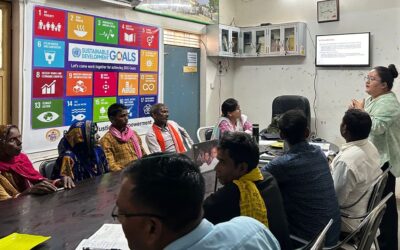Despite the fact that slavery is illegal, modern day slavery thrives in many parts of India. There are millions of bonded labor slaves in the sub-continent. Most of these are Dalits—people of the so-called “untouchable” caste—who are saddled with bogus debts they can never work off. In order to receive the government compensation for being enslaved, victims must secure “release certificates” from the government, which officially recognizes their emancipation.
Release certificates are usually given to victims who have already been transported to their place of enslavement, and are in the midst of laboring against their will. But what about victims rescued in the middle of transit—who have already been saddled with debt, but have yet to arrive at their destination?
Bihar, India based anti-slavery NGO and Free the Slaves partner DDWS has organized countless rescues of trafficking victims at transit points like train stations and bus terminals. By doing so, DDWS has been able to save people even before they were subjected to long term confinement and forced labor.
But DDWS struggled to provide these victims with comprehensive support because, until recently, the local government did not recognize that these people in transit were already enslaved, and would not give them release certificates and support services.
“[These] victims travel under bonded conditions,” a recent DDWS report said. “They have already been put under a bond in their village when they or their family members take an advance or loan from the brokers/traffickers, pledging their labor.” The report continues: “Still, district administrations would not even take statements of these victims… and they always ignored medical checkups.”
But there are signs that things are changing. Late last year, DDWS organized a rescue team that intercepted five children in the midst of being trafficked. And for the first time in Bihar, the local District Magistrate agreed to give these victims release certificates. This sets a new precedent for the state—and may indicate a major breakthrough in the local government’s approach to eradicating slavery.
Free the Slaves Partnerships Director Ginny Baumann says, “It’s an important policy achievement to have release certificates issued while bonded labor slaves are still in transit because many victims are rescued at that point—and if they don’t get practical help, they may get re-trafficked. If the issuing of release certificates, and subsequent financial compensation does become common practice, it will protect many more people.”



